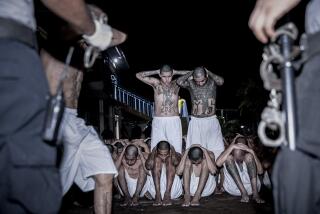Cuban Dissidents Reportedly Face Harsh Jail Conditions
- Share via
HAVANA — At least 20 Cuban dissidents, part of a group of 75 journalists, librarians and economists arrested nearly a year ago, are seriously ill in Cuban prisons where they are being held under inhumane conditions, their wives, friends and human rights activists say.
“They are killing these people,” said Miriam Leiva, whose imprisoned husband, Oscar Espinosa Chepe, suffers from cirrhosis of the liver. Espinosa Chepe, 63, an economist sentenced to 20 years for criticizing Fidel Castro’s economic policies, is being held in a cell at a military hospital in Havana, Leiva said.
His cell has no windows or running water, and the lights are kept on 24 hours a day, she said. He has lost 40 pounds, is unable to eat and has a fungal infection covering his legs, she said.
Information about conditions faced by the dissidents comes in letters from prison, occasional phone calls and family visits. The International Committee of the Red Cross, rights groups and journalists have not been granted access to the prisons.
Elizardo Sanchez, who heads the Cuban Commission for Human Rights and National Reconciliation, said about half of the 75 activists are in 3-foot-by-6-foot cells with no windows, little ventilation and no running water.
Castro’s government rounded up the dissidents last March and charged them with conspiring with the U.S. to subvert the communist government.
The crackdown has damaged Cuba’s relations with friendly nations, particularly in Europe, and has cost the island tourism revenue and foreign investment.
In a 4 1/2-hour speech to economists Saturday, Castro did not mention the crackdown. Instead, the president asserted that the U.S. economy hangs by a thread and noted that Cuba -- after four decades under a U.S. economic blockade -- continues to offer free healthcare and boasts an infant mortality rate lower than that of the United States.
Castro also took shots at President Bush, saying he “couldn’t debate a Cuban ninth-grader.” He recited for half an hour from “Dos Cabalgan Juntos” (“Two Men Riding Together”), a book of purported malapropisms by Bush and Spanish Prime Minister Jose Maria Aznar.
“The great difference” between Cuba and the United States is that Cuba “has learned to do a lot with very little,” Castro said at the meeting of Economists on Globalization and Development Problems.
More to Read
Sign up for Essential California
The most important California stories and recommendations in your inbox every morning.
You may occasionally receive promotional content from the Los Angeles Times.










